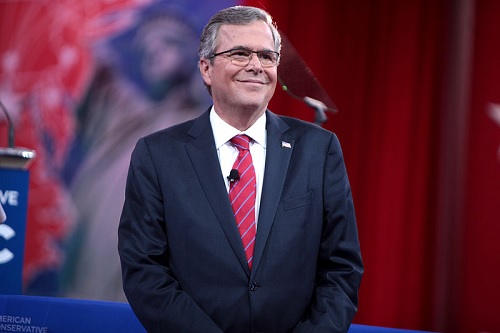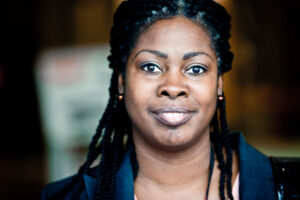
April 13, 2015;Christian Post
The approaching primaries drive the major candidates for the main political parties to extremes—for Hillary Clinton and the Democrats, it’s to the left to ward off potential challenges by Massachusetts Senator Elizabeth Warren and Vermont Independent Bernie Sanders; for the Republicans, it’s to the right, where candidates or potential candidates such as Ted Cruz, Rand Paul, Bobby Jindal, and others roost comfortably. Is likely presidential aspirant Jeb Bush a Republican mainstreamer being tugged to the edge, or actually not so different than what is characterized as a politically more conservative wing of the party?
In an interview with Focus on the Family to be aired shortly, Jeb Bush echoes politico-religious themes more typically voiced by the likes of Cruz and Jindal. In the audio recording obtained by the Christian Post, the former Florida governor announced that the U.S. is the best hope of the world for religious freedom and spoke against reproductive choice (in his terms, the killing of unborn children) and assisted suicides.
“I don’t think you pull back from your deeply held views,” Bush told his interviewer. “You need to persuade people that protecting an innocent child is a definition of who we are in the broadest possible sense.”
Bush’s interview with Focus on the Family was timed roughly for the tenth anniversary of the death of Terri Schiavo. Schiavo was diagnosed in a vegetative state in 1990, but the 1998 petition of her husband Michael to remove her feeding tube was resisted by her family and by pro-life advocates until a court order allowed it in 2005. “The most vulnerable in our society need to be protected,” Bush said about assisted suicides like Schiavo’s, which Bush resisted through his executive powers as governor at the time. “They need to have legal rights, and as a society we need to recognize their value and their worth.”
Is this Jeb Bush tacking toward the religious right as the primaries near, or has the Republican mainstream gone so far to the right that a conservative like Bush has to consistently reaffirm these positions as “deeply held beliefs…informed by…[his] faith”?
Perhaps the distinction is that the Republican right wing that is focused on “culture wars” issues doesn’t particularly connect to the economic and social policies that characterize core Republican positions. If the measure is Bush’s education policies, the foundations funding his Foundation for Excellence in Education, whose board he recently left, appear to be as rock-ribbed conservative as any, as indicated by these grant totals for FEE posted on the Foundation Directory Online:
|
Foundation |
Grant Total |
Years |
|
Lynde and Harry Bradley Foundation |
$380,000 |
2010–2012 |
|
Dick and Betsy DeVos Foundation |
$160,000 |
2009–2012 |
|
Kern Family Foundation |
$200,000 |
2011–2012 |
|
Kovner Foundation Sign up for our free newslettersSubscribe to NPQ's newsletters to have our top stories delivered directly to your inbox. By signing up, you agree to our privacy policy and terms of use, and to receive messages from NPQ and our partners. |
$500,000 |
2012–2013 |
|
Bill and Susan Oberndorf Foundation |
$224,531 |
2010–2012 |
|
Robertson Foundation |
$1,000,000 |
2011–2012 |
|
Charles and Helen Schwab Foundation |
$1,625,000 |
2010–2013 |
|
William E. Simon Foundation |
$100,000 |
2010–2012 |
|
Walton Family Foundation |
$4,842,000 |
2009–2012 |
There is a lot of shared conservative belief among these foundations. The Bradley Foundation has been a longtime promoter of conservative policies. Dick DeVos has been a longtime free-market advocate, a Republican candidate for governor in Michigan, and a strident anti-union and pro-right-to-work activist, and his wife Betsy has been a chairperson of the Michigan Republican Party. The Kern Family Foundation has been a funder of religious colleges and of local education reform. Although his foundation is known for its support of music and the arts, particularly the Julliard School, Bruce Kovner is a former chairman of the American Enterprise Institute and a donor of half a million dollars to the super PAC that supported Mitt Romney’s presidential run. William Simon was Secretary of the Treasury in the Nixon administration. The politics of the Walton Family Foundation need no description in terms of education and economic policies.
A decade ago, a philanthropic funder lineup like that would cement Jeb Bush’s credentials as a conservative, but the fact that FEE has also attracted crossover money from quasi-liberal entities such as the Laura and John Arnold Foundation ($1 million in 2013), the Eli and Edythe Broad Foundation ($400,000 in 2011), the Carnegie Corporation ($900,000 between 2011 and 2013), and the Bill & Melinda Gates Foundation ($5,152,553 between 2010 and 2013) may make him suspect in some Republican circles. Rather than demonstrating his ability to draw support from across the political spectrum or to convince those across the aisle of the correctness of his conservative theories, Jeb Bush finds that his ability to draw support from the likes of Gates and Broad puts him in a position where he needs to convince his own political party that he shares enough of their extreme beliefs that he can stand credibly as a Republican presidential nominee.
Will a Focus on the Family interview on religion, assisted suicide, and reproductive choice make Jeb Bush more attractive to the powerful far right wing of the Republican Party or less attractive to the middle-of-the-road American electorate heading out to vote in 2016?—Rick Cohen













